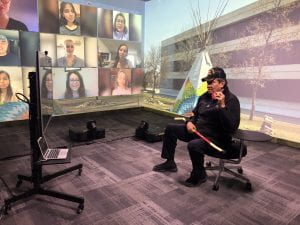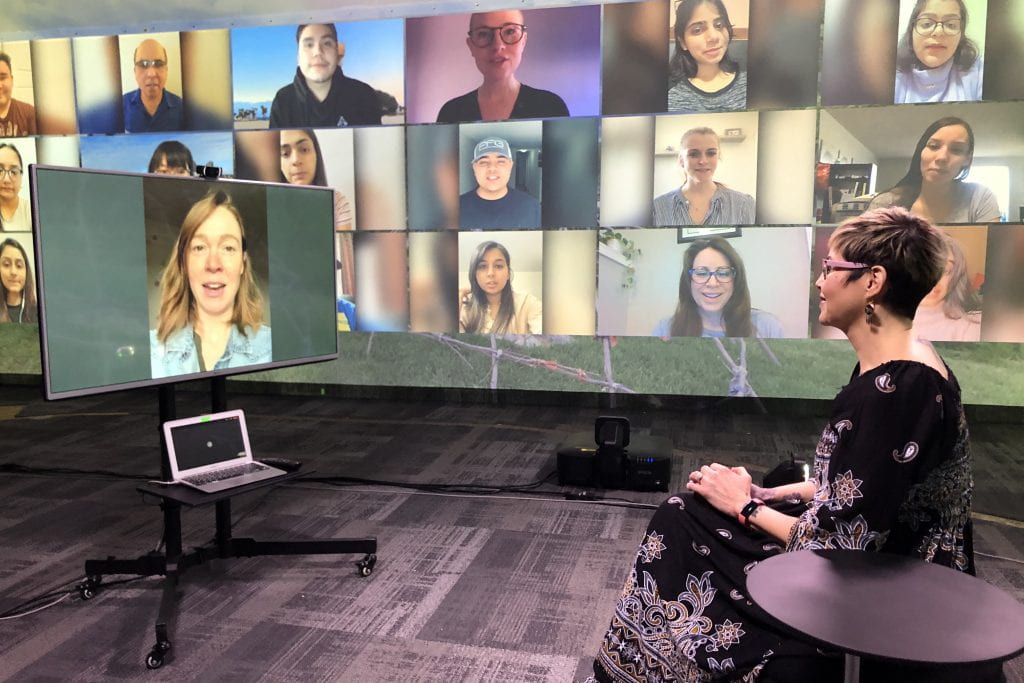Have laptop, will travel: New virtual projects turning RRC students into global citizens
The Government of Canada has chosen Red River College to take part in an innovative pilot project aimed at getting more students involved in international exchange opportunities, especially students facing barriers to working and studying abroad.
The Outbound Student Mobility Program, designed and administered by Colleges and Institutes Canada (CiCan), was launched last year to provide more Indigenous students, students with disabilities, and students facing financial need with opportunities to expand their perspectives and apply the global competencies they gain abroad to the careers they pursue back home.
At least, that was the plan.
Since then, the COVID-19 pandemic has added a new challenge to the mix: accomplish all of the above, but without the need to physically fly students across borders.
Raeanne Hebert, a Business Information Technology (BIT) instructor at RRC, was about to travel to Brazil to help develop an exchange program there when the pandemic struck, halting the program in its tracks. However, development funding from the Outbound Mobility project gave her the opportunity to pivot the geographic exchange into a virtual one.
That initiative is now well underway: for the past three months, students in RRC’s BIT program have been connecting online with computer engineering students from the Federal Institute of Ceará (IFCE) to develop solutions for local entrepreneurs, including IT for a drone that delivers pesticides, a fitness and nutrition app, and an energy metering device for a power monitoring dashboard. They’ve completed three projects together so far.
“Students from both countries connect in RRC’s virtual Project Space and program together online for about four hours a day,” says Hebert. “They’ve been learning a lot from one another.”
Hebert says international exchanges — virtual or physical — are critical to opening students’ eyes to other cultures and ways of life, to breaking down stereotypes, and to strengthening relationships and connections.
They’re also vital to fostering innovation.
“When it comes to the future of IT, innovation is 1,000 per cent important. Exchanges like these help our students learn how other countries do things. They teach us innovative solutions to the problems we all face.”
Margarita Natcheva is coordinating Outbound Mobility projects at RRC through its Centre for International Education and Global Partnerships (CIEGP). She says the College’s project leads have put in a tremendous amount of work and creativity into designing projects that will live up to the Government of Canada’s expectations, which are transforming students into nothing short of truly global citizens.
 “Canada has to keep up with the world,” she says.” For that to happen, our students need to engage and interact with students from around the world. By learning about the world outside Canada, they are also learning about themselves. There’s no way for our students to do that if we don’t open the door.”
“Canada has to keep up with the world,” she says.” For that to happen, our students need to engage and interact with students from around the world. By learning about the world outside Canada, they are also learning about themselves. There’s no way for our students to do that if we don’t open the door.”
Ken Friesen, program manager for RRC’s Transportation Trades department, agrees. “Many of our students don’t realize the reality of the world outside our borders. Then they see several students in Jamaica sharing one textbook because they can’t each afford their own, and they begin to appreciate the value of what they have here.”
Friesen was actually in Jamaica last year, developing an RRC partnership with the Montego Bay Community College (MBCC), when travel restrictions forced him home early last. Like Hebert, he’s using funding from Outbound Mobility to create a virtual exchange — this time, to train automotive professionals.
In September, four students from MBCC will join students in RRC’s 10-month Automotive Certificate program, which is currently being delivered to RRC students via a blend of online and on-site practical learning. MBCC students will participate online.
RRC instructors will monitor the Outbound students’ practical assignments live with video equipment supplied by RRC and funded by CiCan.
“This will allow for guidance and positive feedback as they perform their practical assignments,” says Friesen. “They will also have the option of recording their practical tasks if live streaming is not possible.”
The College is also sending training aids, textbooks and various precision tools so the Outbound students can participate alongside their RRC cohorts during class time using the same equipment.
Arrangements have been made for an automotive dealership in Montego Bay to provide students there with hands-on work opportunities, an important step in preparing them for careers in a country already facing an urgent need for qualified automotive professionals.
“On top of that,” adds Friesen, “they’ll be able to put international learning experience on their resume, something that otherwise wouldn’t have been possible.”
Virtual exchanges aren’t the only approach RRC is taking to Outbound Mobility. CiCan also awarded funding to a video series produced by RRC students in health sciences and community services, Indigenous education, and social innovation and community development.
In the videos, students ask questions about Indigenous traditions, world views and culture. Indigenous Elders will then be recorded answering the questions. The goal of the series is to foster understanding among students and professionals working in those disciplines and beyond.
Project co-lead Pamela McLeod, an instructor in Social Innovation and Community Development, says the videos build on similar series that many faculties have produced in the past to enhance online learning.
“The questions and answers have a wide-ranging applicability,” says McLeod. “Students ask about everything from Indigenous beliefs and practices related to diet and nutrition to family relations and alliances, how to gather and use traditional Indigenous medicines, the politics and history of traditional Indigenous dance, and what to think about when, for example, you’re a nurse treating an Indigenous patient.”
Alison Fyfe-Carlson, a Nursing instructor and project co-lead, says they plan to package the video series into a workshop, which will raise funds to support future exchanges for students facing financial barriers to participating in intercultural travel opportunities.
“A smaller-scale project like this video series will help get more students involved, raise awareness about the benefits of international exchange, and boost their confidence in themselves.”
If and when travel restrictions allow students to resume travel between countries, all three project leads will then extend their projects into more traditional international exchange opportunities. Each of them agrees that nothing beats the life-changing impact of getting out there, leaving behind your comfort zone, coming home a global citizen with greater confidence and a broader perspective.
On the other hand, all three also agree that virtual exchanges and inter-cultural projects such as the ones currently funded by Outbound Mobility — which lower barriers to access and in some ways create even more opportunities for students to participate — are here to stay. The solutions they provide will make it possible for Red River College to engage more students, both within Canada and beyond, to participate in valuable intercultural experiences.
“We live in a global world,” says Fyfe-Carlson. “Nothing has brought that home more than the pandemic. We need grads [who are] ready to work in a global world, because global problems need global solutions.”
The Canada Outbound Student Mobility Program is administered by Colleges and Institutes Canada (CICan), funded by the Government of Canada, and delivered in collaboration with Universities Canada, as part of Canada’s International Education Strategy.

